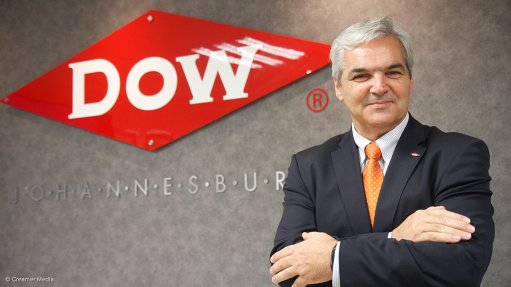
Dow plastics division director Felip Vidiella
With continued rapid urbanisation in South Africa putting pressure on the food and beverage industry in terms of food safety, shelf life and adequate supply transportation, packaging manufacturer Dow is focusing on developing innovative and sustainable solutions to mitigate these types of challenges.
Addressing members of the press at Dow’s Johannesburg offices on Thursday, Dow R&D director Felip Vidiella highlighted packaging innovation as vital when it comes to meeting the needs of a growing population.
Vidiella noted that flexible plastic packaging played a significant role in spurring economic development and supporting a more sustainable world. “For example, flexible plastic packaging can extend the shelf life of food from three days to over 14 days, with in-store waste reduced from an average 3% of stock to less than 1%.
“The use of polyethelene in packaging, for example, grows at 3% per year and is linked to the gross domestic product of a country. Urbanisation will force packaging to be a more sustainable product in the future,” he averred.
Dow sustainability manager Alessandro Corticelli added that, owing to urbanisation, the world’s population will reach 8.5-billion by 2030.
“This means that 50% more food, 40% more water and 30% more energy will be needed,” he said, adding that a third of the world’s food is wasted each year, which is equal to 1.3-billion tons a year.
This is despite almost 870-million people in the world who are chronically undernourished. “Current food production is enough to feed the undernourished and malnourished populations of the planet. Fifty per cent of food loss can be reduced by better packaging. Further waste management is clearly needed,” noted Corticelli.
He added that two of Dow’s initiatives, ‘Fresh to Table’ and ‘Move it Safely’, focus on how sustainable packaging can protect food in transit and on store shelves, guarding against contaminates and sealing in freshness.
Dow Europe, Middle East and Africa region commercial VP Javier Constante further highlighted how important it is for the company to work with its strategic partners to take the company’s innovations even further.
“We are focused on making the African region safer, healthier, cleaner and more sustainable,” he noted.
Constante highlighted that one of Dow’s latest innovations was its ADCOTE L86-500 barrier adhesive for flexible packaging.
“This product helps to increase resource efficiency, favourably influence packaging costs, enhance recyclability and optimise the shelf-life of food packaging.”
In 2015, Dow announced a strategic set of commitments designed to redefine the role of business in society. This includes a commitment to advance the world’s transition to a circular economy, where resource efficiency is drastically improved and waste is designed and recycled into new products and services.
The company aims to meet these commitments by 2025.
Constante explained that, to make the most of the world’s limited resources, landfill reduction was necessary.
“This will not only help reduce our carbon footprint, but will also eliminate the need to continue to use precious space, time and money in building new landfills to bury resources. Our long-term vision for resource management is one where all materials are recovered and their value put to beneficial use.”
Constante explained that, when it comes to plastic packaging, this means materials can be collected using the current collection infrastructure; all materials that are suitable for mechanical recycling are turned into plastic pellets to manufacture new plastic articles.
Items that aren’t recycled into pellets are converted into chemical feedstock or used as an energy resource.
PROJECT BUTTERFLY
Keeping with the spirit of sustainability, Dow has partnered with Plastics SA and Destination Green and officially launched the Project Butterfly initiative in Tembisa, in the east of Johannesburg, this week.
The project, an intensive litter clean-up operation, involves communities cleaning up waste-ridden areas throughout the country.
“Litter and waste is one of South Africa’s most pressing and visible environmental issues, with recycling often not being seen as a priority. Over and above this, South Africa faces challenges with irregular refuse collection, particularly in the rural townships, which results in large amounts of waste collecting in the streets and rivers,” said Constante.
He added that Tembisa was one of the many areas in the country that suffered from problems such as improper waste management, water pollution and land degradation.
“As a plastics manufacturer, Dow believes that littered plastics and materials of any kind do not belong in the environment. However, every day, plastics can positively contribute to environmental sustainability by enabling us to reduce, reuse, recycle and recover more of the resources that we rely on,” he concluded.